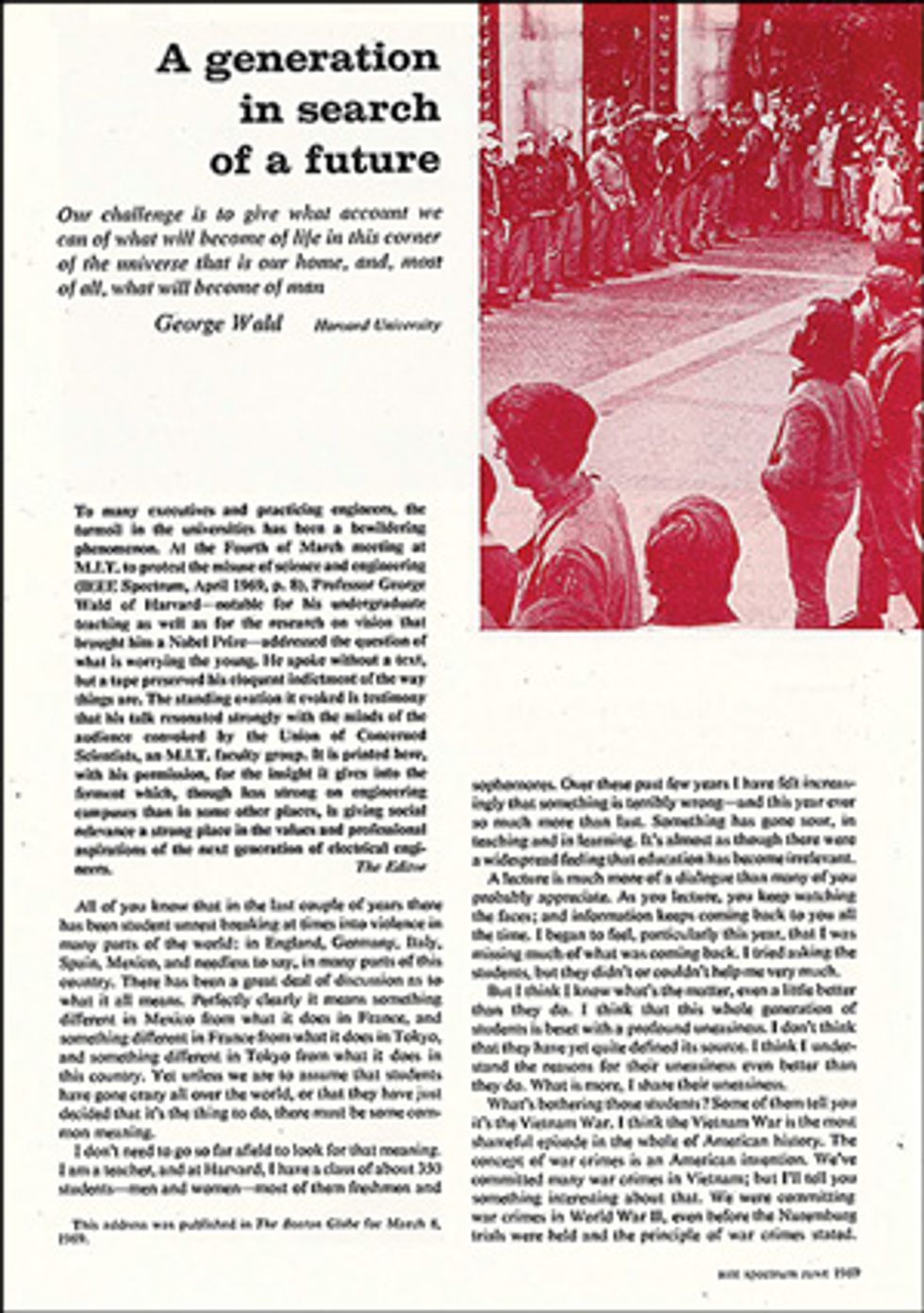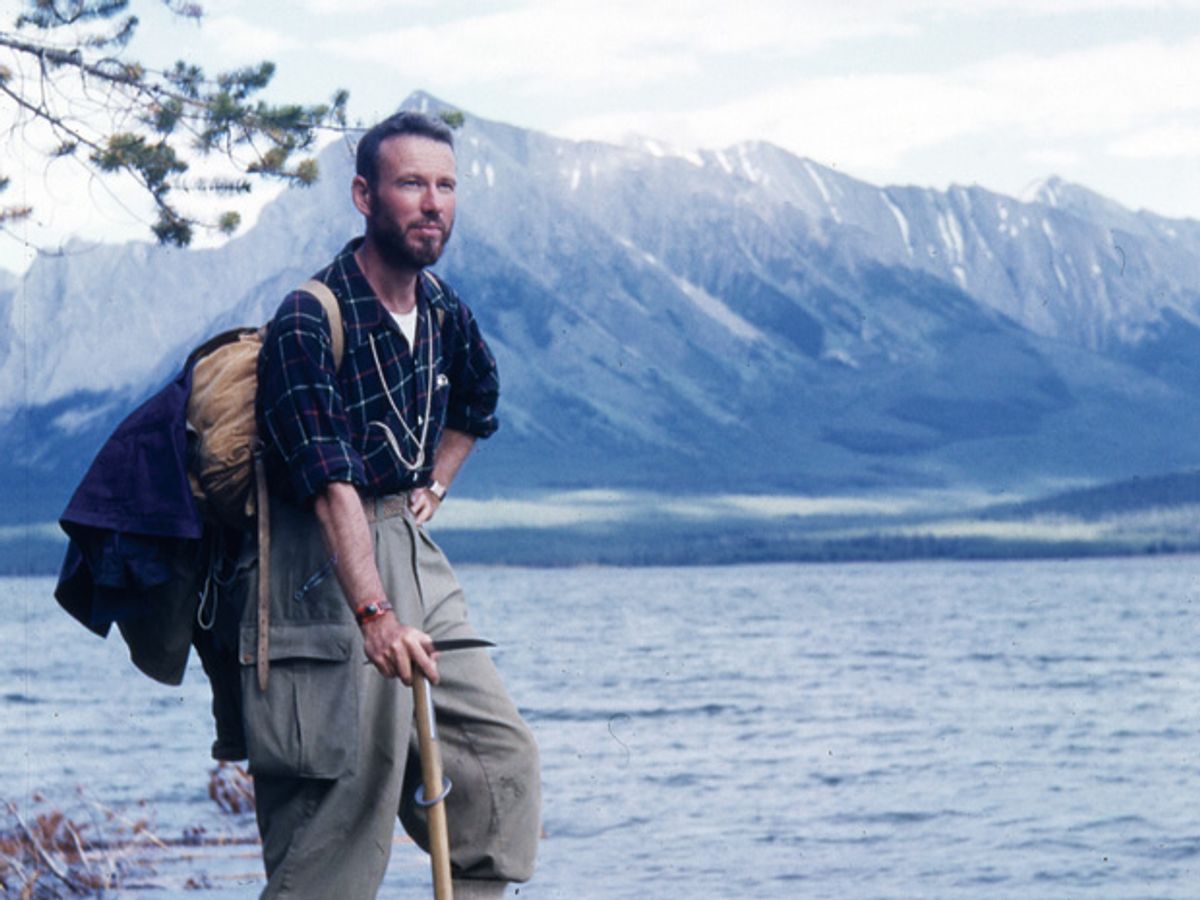Editor's note: In this 50th anniversary year of IEEE Spectrum, we are using each month's Spectral Lines column to describe some pivotal moments of the magazine's history. Here we describe the surprising and eventful tenure of the magazine's third editor, J.J.G. McCue.
At the tender age of 5, IEEE Spectrum had its first identity crisis, and it was a doozy. The year was 1969, and the United States was racked by intense social and political upheaval. The war in Vietnam was prompting huge demonstrations, and as that tumult inevitably seeped into the offices of Spectrum, the magazine was soon forced to decide whether it was going to incorporate timely journalism or be another academic journal, disconnected from the important issues of the day.By shoving the young magazine firmly toward journalism, one extraordinary man precipitated the fledgling magazine's crisis—and bestowed on the publication one of the greatest favors it would ever receive. He was Spectrum's third editor, and his name was J.J.G. “Jerry" McCue.
The episode began with a letter published in the April 1969 [PDF] issue of Spectrum. It came from the Union of Concerned Scientists, which had been recently formed at MIT. It started with these words: “Misuse of scientific and technical knowledge presents a major threat to the existence of mankind. Through its actions in Vietnam our government has shaken our confidence in its ability to make wise and humane decisions." The letter was followed two months later in the magazine by an article [PDF] in which George Wald, a Nobel Prize winner and professor at Harvard University, referred to the Vietnam war as “shameful and terrible."
A mail squall soon pelted the Spectrum and IEEE offices. Some of the letter writers applauded the Union of Concerned Scientists letter or Wald's article. Quite a few more criticized them, some thoughtfully, some not. One in the latter category disclosed that he had written to his congressman requesting that McCue be tried for treason.
The 55-year-old electrical engineer at the center of this postal paroxysm was an improbable target. John Joseph Gerald McCue was a respected researcher, university professor, textbook author, and a dutiful IEEE volunteer. He had graduated from high school in New Jersey at age 16 and then worked on a vacuum-tube project at Bell Laboratories in 1930 before going off to college at Harvard and then on to a Ph.D. in physics, under the great Hans Bethe, at Cornell.
As an adult, he loved mountain climbing and what we now call adventure travel. He was also an early and ardent collector of Shaker furniture. Indeed, much of what we know about McCue, who died in 2011, comes from a family in the antiques business. Will and Karel Henry became friendly with McCue and his wife, Miriam, in the 1980s and recently sold much of McCue's huge Shaker collection. The Henrys' son, Tyler Henry, interviewed McCue several years ago and wrote a biographical essay for the catalog of the collection.
That essay, combined with McCue's own writings for Spectrum, revealed a complex and nuanced man. A registered Republican, he had worked on a secret radar project at the MIT Radiation Laboratory during World War II. During his editorship of Spectrum, he was an engineering researcher at Lincoln Laboratory, a leading defense-industry research organization. There he had done pioneering work for the U.S. Navy on the physics of bat echolocation.
McCue, like all editors of Spectrum until 1972, was drafted into the role from the ranks of high-level IEEE volunteers. He had not been trained as a writer, and before his service at Spectrum, his editing experience had been limited to some associations with academic journals. And yet at Spectrum and during those turbulent times, he would show remarkable insight and judgment, and those qualities would prove critical to Spectrum's future.
McCue was deeply interested in not only the larger issues of journalism and publishing and ethics but also in the craft of writing itself. His Spectral Lines columns are invariably thoughtful, well structured, and written with imagination and discipline. Here's a passage from a 1969 column: “In the past 30 years the groves of Academia have turned into jungles, whose denizens have learned that in the struggle for existence, the writing of review articles has little survival value." He had also published an article and photographs in National Geographic magazine and authored a book, The World of Atoms: An Introduction to Physical Science (1956). It is unusually well written for a textbook.
The upshot is that at that pivotal time in Spectrum's history, the magazine had as its leader precisely the person it needed: a man of impeccable engineering credentials who could think like a magazine editor and who also had courage and vision. There weren't many people like him, then or now.
McCue's widow, Miriam, says that her husband tried to keep his work at Spectrum secret from his employers at Lincoln Laboratory, because any such moonlighting was officially forbidden there. But McCue knew that what he was doing at Spectrum was important. “He'd come home from work at 5:30 or 6:00, then after dinner he'd go up to his office and start working again," she recalls. Sometimes “he'd be up at 1:00 or 2:00 or 3:00 a.m., working for Spectrum," she adds.

To the onslaught of hysterical letters following the Concerned Scientists letter and the Wald article, he responded with equanimity and by publishing many points of view, even ones he surely found abhorrent. In fact, he printed many more angry letters than supportive ones. When several readers complained that the letter from the Union of Concerned Scientists was unsigned, he responded by printing the names of the people involved. The list included such distinguished EEs as Mildred Dresselhaus, Murray Eden (who would later serve on Spectrum's advisory board), Samuel J. Mason, Marvin Minsky, Arthur R. von Hippel, and Joseph Weizenbaum.
To those who insisted that Spectrum stop covering controversial topics, he had a succinct response: “In the plan for Spectrum originally laid down by the Board of Directors in 1963, one of the functions of Spectrum was to be the publication of 'News of political and social interest to the profession.' Until the past few months, this policy has been pretty much of a dead letter. If it is taken seriously in these times of questioned values, it must result in the treatment of controversial themes."
Some suggested that Spectrum should be permitted to cover a controversial topic—but only if it gave space simultaneously to “the other side." It's an idea that seems logical at first glance. But it is actually impossible to implement without incurring costs that no good magazine would ever accept, namely, being forced to throw out many excellent articles or publish them months after they had ceased being timely or relevant. McCue had encountered this problem firsthand, and he sought to explain it to readers by citing one of his own recent experiences.
It involved a draft article that sought to explain why the Tennessee Valley Authority, a U.S. federal power generator, was buying equipment from non-U.S. suppliers. One reviewer demanded that the story be accompanied by another one arguing the other side—that “the U.S. Government should buy domestic products even when foreign ones cost less," McCue wrote. “I invited him to write such an explanation, but he said no. Nor would he name anybody who might write it."
Faced with a choice between publishing a timely, relevant article with a point of view or shelving that article indefinitely—and probably forever—McCue chose to publish. As any good magazine editor would do.
Regarding his own role—and this very column—he wrote: “In this column, over his name, the Editor may properly make comment that is colored by his political or ideological bias, but he is expressing his own opinion, not that of the Institute, and if he permits his bias to affect his selection of material to be published, he is not doing a good job."
Meanwhile, the IEEE's president, F. Karl Willenbrock, was surfing another tsunami of letters, some of them angrily demanding McCue's immediate resignation. Willenbrock, a Brown University graduate, found that when it came to controversial subject matter in Spectrum, the IEEE “did not have a defined policy in this area." The IEEE Publications Board soon drafted one. Published in the September 1969 issue of Spectrum, it was accompanied by a letter from Willenbrock asking for members to read it and send him their opinions.
The proposed policy had four provisions, and they were explicitly declared to apply not just to Spectrum but to all material published by the IEEE. The most notable was an exhortation that “every effort should be made to provide for adequate and timely presentation of differing viewpoints." A key word here is “timely." It suggests that the board understood the ludicrousness of attempting to force a magazine to always provide simultaneous opposing views on any matter that might at any time (and by anyone) be deemed controversial.
Another provision called for subject matter to “have some relevance" to electrical engineering “or to the relationship of that work to the needs of society." There were also stipulations that authors be “responsible or representative spokesmen for the viewpoint they espouse" and that it be clear that they were giving their own opinion, and not the IEEE's.
Those 1969 provisions are basically still in effect. Today, they are incorporated into the IEEE Publication Services and Products Board Operations Manual [PDF] as section 8.1.3, “Presentation of Nontechnical Material." And after 45 years, you might think the fact that Spectrum covers controversial subjects would no longer itself be a controversial topic, but sometimes it is. However, every time IEEE members have ever been asked whether they want Spectrum to be free to wade into controversy, or to always shy away from it, an overwhelming majority have said they want us to keep wading.
Spectrum's freedom to publish controversial articles is what sets us apart from most other association publications. It's a major reason why we have won about 150 significant journalism honors over the past decade: This freedom enables us to attract top talent to our staff and to unleash them to do first-rate work. Among the best of this work are articles and multimedia segments whose investigative revelations served IEEE members and also society at large—thereby fulfilling the IEEE's core mission of supporting and explaining technology for the benefit of humanity.
In recent years, these included hard-hitting articles on such topics as fiascoes in big-government IT projects; efforts to maintain a power plant in the Gaza Strip; the Fukushima Daiichi reactor meltdowns and their aftermath; the massive failures in electrical reconstruction in Iraq and Afghanistan; the supposed crisis in STEM education; and the often-overlooked environmental costs of electric vehicles.
Though J.J.G. McCue was an engineer, he instinctively grasped something that all journalists know and that the writer Albert Camus expressed most concisely. “A free press can of course be good or bad," he said in 1955. “But, most certainly without freedom it will never be anything but bad."
This article originally appeared in print as “When Freedom Rang."
